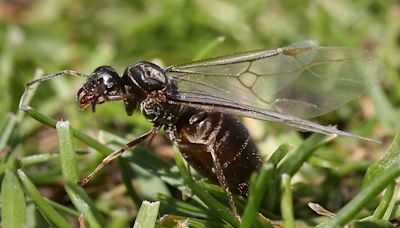Search results
People also ask
Are ants a sting?
What is an ant bite/sting?
What happens if you get a sting from an ant?
Why do ants bite?
What to do if you've been bitten or stung by an insect. You can often treat an insect bite or sting without seeing a GP. Removing stingers, ticks or caterpillars. If anything is left on or in your skin, the first thing you need to do is remove it carefully.
- How Is An Ant Bite Treated?
- Should I Pop An Ant Bite?
- How Long Do Ant Bites Last?
Ant bites usually go away on their own and don't need treatment, but treatment is available to alleviate your symptoms if they cause discomfort. Most treatment options are available at home and do not require an office visit to see your healthcare provider unless your symptoms are severe. If you notice you have an ant bite or sting, immediately was...
Depending on what type of ant bite you have, the bite or sting can turn into a blister. It might be tempting to pop the blister, but don’t pop it! Popping a blister could lead to an infection. An infection is when bacteria and germs enter your body. Signs of an infection include: 1. Fever, chills, difficulty breathing. 2. Pain and feeling sore at o...
Ant bites usually go away after a few days. Stings from fire ants last longer based on how much venom they release under your skin. It typically takes anywhere from three to seven days for a fire ant sting to go away and for you to feel better. If you don’t feel better after a week to ten days, contact your healthcare provider.
Nov 30, 2023 · There are a few ways to figure out which insect stung or bit you, even if you didn’t happen to see it. Check for a stinger in your skin, look for a hive nearby, and try to recall whether an insect was flying near the ground or higher up.
- Daniel More, MD
Apr 28, 2024 · Ant bites are actually stings, usually caused by fire ants. These bites lead to painful or itchy spots and can result in an allergic reaction in some people.
- Maggie O'neill
- 1 min
Jun 1, 2023 · What is commonly referred to as ant bites are actually ant stings. After an ant sting, you’ll most likely experience an initial burning or itching sensation. Then, you'll likely have pain, redness, and/or swelling in the area of the sting for a few hours.
- Laura Dorwart
An ant bite/sting occurs when an ant bites using their mandibles or stings with a stinger to puncture human skin. The typical reaction to many ant bites and stings is a localised urticaria.
Oct 25, 2022 · How do you know if you've been stung by a fire ant? Fire ant stings start as small red spots and after a day or two a white itchy pustule forms. You may see a row of red marks if you're stung...

